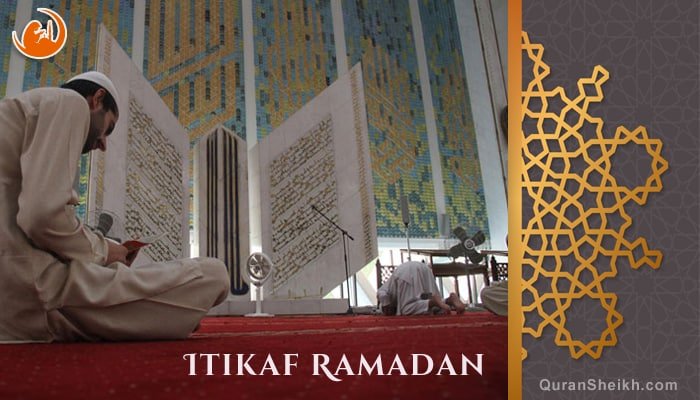Itikaf meaning:
Itikaf is an Islamic practice consisting of a period of staying in a mosque for a certain number of days, devoting oneself to Ibadah during these days and staying away from worldly affairs. The literal meaning of the word suggests sticking and adhering to, or being regular in something, this ‘something’ often including performing nwafil, reciting the Quran, and Zikar Ul Allah.
Itikaf is a special kind of Ibadah that is done at any time of the year but it is specific only for the Holy month of Ramadan in which a person gives up all his activities, abandons his attachments, associations, and routines and enters the mosque for a specific period.
Itikaaf is a type of restricting yourself to Masjid for Prayers only in the last 10 days of Ramadan. During this period, you are forbidden to cut your nails, hairs, and even you cannot take a general bath unless there is a need for a mandatory bath due to wet dreams.
In Itikaf, Muslims spend the last ten days of Ramadan in seclusion in a Mosque for a certain time; all they do is pray to Allah Almighty seeking forgiveness and blessings. In Itikaf, one should stay with the intention to worship Allah (SWT) by praying formal or informal prayers although prayer is not a condition therein. Hazrat Aisha (RA) reported about our beloved Prophet Muhammad (SAW) that:
“He (SAW) used to perform Itikaf in the last ten days of Ramadan until Allah the Mighty & Majestic, took him.” (Bukhari)
Islam does not approve monasticism which is based on the concept that Allah’s pleasure cannot be attained without abandoning all worldly activities forever.
The Holy Qur’an has expressly condemned this concept. Islam has, instead, emphasized earning one’s livelihood through permissible means, on one’s mingling with his family members and on discharging all the obligations toward his wife, children, relatives, and neighbors. But sometimes one’s deep involvement in these activities slows down his spiritual progress. In order to repair this loss, a Muslim is required to spare a time in which he separates himself from the normal routine of worldly activities and to sit in seclusion, devoting his heart and soul for pure spiritual acts. Itikaf is a beautiful way to carry out this objective.
In Itikaf one leaves his home and family and undertakes to remain in the mosque for a limited period. This unique mode of worship can be done at any time in the year. However, it has been declared as a ‘Sunnah mu’akkadah’ in the last ten days of Ramadan, because Ramadan is the most suitable time to carry out this worship.
Moreover, the last ten days of Ramadan are the days in which ‘Lailat-ul- Qadr’ normally occurs and its definite time is unknown. It may occur in any of the odd nights of these days.
When one is in the state of Itikaf for the last ten days of Ramadan, he can surely benefit from its infinite merits, because even if he is sleeping in the ‘Lailat-ul-Qadr’, while he is in the State of Itikaf, it will be credited to his account as ‘worship’ in the ‘Lailatul-Qadr’, because each and every second in the state of Itikaf is ‘Ibadah, even if one is eating, drinking or sleeping.
This extraordinary privilege cannot be attained in one’s home. That is why the Holy Prophet (PBUH) used to perform Itikaf every year in Ramadan.
Join thousands of Muslim Families who love learning Quran, Arabic and Islamic Studies from the comfort of their Homes.
Virtues of Itikaf:
Itikaf is the order from Allah and it is the Sunnah of the Holy Prophet (PBUH). In the Holy Quran, Allah Almighty says (interpretation of the meaning):
“And We commanded Ibrahim and Ismaeel (Peace be upon Them) that they should purify My House (the Kabah at Makkah) for those who are circumambulating it, or staying (Itikaf), or bowing or prostrating themselves (there, in prayer)” [al-Baqarah:125].
Also, Allah Almighty says:
“And do not have sexual relations with them (your wives) while you are in Itikaf (i.e. confining oneself in a mosque for prayers and invocations leaving the worldly activities) in the mosques” [al-Baqarah:187]
Regarding the Sunnah, there are many hadeeths, such as the hadeeth of Ayesha (may Allah be pleased with her) who said that:
“The Holy Prophet (peace and blessings of Allah be upon him) used to observe Itikaf during the last ten days of Ramadan until Allah took His soul, then his wives observed Itikaf after He was gone. (Narrated by al-Bukhari, 2026; Muslim, 1172).
The month of Ramadan itself is one of the greatest blessings that a Muslim receives. Within this Holy month of blessings, the virtues of Itikaf are also a great advantage and a source of mercy and blessings from Allah Almighty that can help a Muslim seek forgiveness and attain the reward for the present moment and the months to come till the next Ramadan.
Beside this there are so many virtues of Itikaf which are mentioned below:
- When a Muslim restricts him in the mosque for Itikaf, he is prevented from performing certain acts which are permissible in common routine and in certain cases there is a high reward for such acts.
- To Perform Itikaf during the last ten days of Ramadan is equivalent to the reward of two Hajj and Umrah.
- Itikaf is one such act that guarantees protection from the fire of Hell. Prophet Muhammad (PBUH) said in His hadith:
- “Whosoever for Allah’s sake did even one-day Itikaf, Allah would keep him away from Jahannam by trenches.”(Tabarani)
- Ibn Abbas (RA) reported that our beloved Prophet (SAW) said about one who engages in Itikaf,
“That he is safe from sin & he also gets that reward which everyone (outside Itikaf) gets for pious deeds.”(Ibn Majah) - Itikaf provides protection from the evil consequences of excessive talking and also allows the person to concentrate on Allah Almighty by offering Taraweeh, reading Quran, making Dhikr, reciting dua, and so on.
- Observing Itikaf is an excellent way of doing away with sins and receiving a reward from multiple sources.
Quran Memorization Course Online with an Arab teacher with 30% Off
Things to do during Itikaf Ramadan:
All things that are considered Ibadah (worship) can be done in Itikaf. A few good deeds are mentioned below:
- Recite Quran
- Recite Darood
- Read about Islam
- Make Dua
- Talk/think about the good and righteous things
- Do Taubah (repentance)
Things to avoid in Itikaf Ramadan:
- Foul talking
- Buying or selling things in the Masjid
- Having a quarrel or fight with someone
- Disturbing other people in Itikaf around you
- Bringing in too many items
Things that nullify Itikaf
- Going out for some need and staying even after the need is addressed
- Leaving your place without any reason
- Having unwanted company while you are in Itikaf
Itikaf for females:
At the time of the Prophet (PBUH), His noble and chaste wives would perform the worship of Itikaf in the masjid; and if one finds a masjid which has arranged for women to perform Itikaf in the masjid, it is permissible for the believing women who wish to fulfill the worship of Itikaf to do so in the masjid.
But in this day and age, the absolute majority of the scholars and jurists, including the great Imam Abu Hanifah, are of the opinion that it is permissible for the believing woman to perform the worship of Itikaf in their homes.
A believing woman may isolate and dedicate oneself in a corner of a room, or even a room in the house if available to the sole remembrance and worship of Allah Almighty for a fixed period.
Itikaf Masjid:
It is compulsory for men to perform Itikaf in a Masjid, where they can offer all five prayers in congregation. Women can also perform in a masjid if they have the privacy and necessary facilities. Otherwise, they can practice it at home, selecting a corner where they won’t be disturbed and can meditate in peace.
Some rules of Itikaf Ramadan:
- Itikaf in the last ten days of Ramadan is Sunnah ‘al kafaya. It means that in each mosque, at least one person should sit in Itikaf. If does so, the requirement of the Sunnah is fulfilled for the whole society. If no person performs Itikaf, the whole locality is responsible for not observing the Sunnah. Therefore, the residents of a locality should make sure that some person is performing Itikaf in their mosque. If no such person is available, they should prepare someone to do so.
- For men, Itikaf should be in a mosque but for women, the place where she normally prays Namaz in home is acceptable to perform Itikaf.
- A person should stay in a mosque for the duration of the Itikaf except for certain things as described in the prophetic sayings: Aisha (RA) reported that: When the Prophet (SAW) observed I’tikaf, He (SAW) did not enter the house except to relieve himself. (Muslim)
- Fasting is the basic rule of Itikaf.
- It is advisable that a person performing Itikaf df avoids all unnecessary activities and spends most of his time in the acts of Worship, like salah, recitation of the Holy Qur’an or making dhikr or tasbih.









